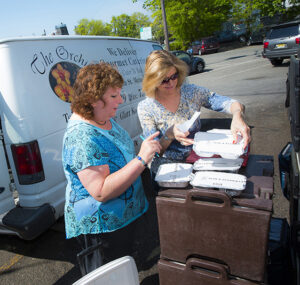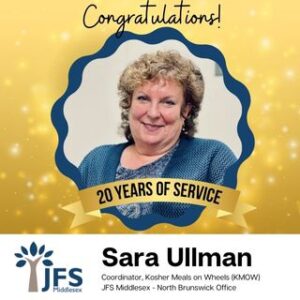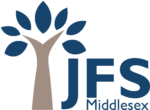
This month, JFS congratulated Sara Ullman, who celebrated 20 years of dedicated service as the Coordinator of JFS’ Kosher Meals on Wheels (KMOW) program. Her journey began by responding to a simple newspaper ad and has since evolved into a legacy of compassionate service that has touched the lives of countless homebound seniors in our community. Under her leadership, KMOW continues to be the largest volunteer-driven program at JFS. In 2022, over 100 volunteers delivered 36,508 kosher meals to 186 homebound seniors. We caught up with Sara to learn more about her experience and what keeps her motivated.
Reflecting on her first day on the job, Sara notes the challenges faced in managing a growing program during a time of change. “It was very chaotic. At the time, the KMOW program and the agencies [JFS] were separate. There was a north JFS and a south JFS. And they had not yet merged…when I started KMOW, it was a very small program. There were only 4 routes, but it had not had someone at the helm for quite a while. There had been a lot of turnover. Several people came and left presumably because it was too overwhelming…it needed a lot of structure put into place and a lot of routine. I was good at those things.”
Her approach to retaining volunteers comes naturally, “treating people with respect.” She has created a community of meaningful connections, forging a sense of belonging among our volunteers and acknowledging their significant contributions to JFS’ mission. Countless KMOW volunteers have faithfully served for decades, delivering meals every week, regardless of the weather. Such unwavering commitment is fueled by a common purpose above all else. For Sara, inspiration to continue her work at JFS can be found through her spirituality, her nature, and the enduring perspective her faith provides. She states, “…part of Judaism is extending yourself to other people. It’s a fundamental value to protect the vulnerable, to welcome the stranger; these are basic values of Judaism that motivate me every day…[recently] the Rabbi said something that stayed with me. He said, ‘compassion is the superpower of the soul,’ which made me think of the silent devotion (Amidah): ‘may my soul be humble and forgiving to all’…I am very motivated by this concept of being part of a community, being obligated to be the best person I can be, being obligated to fulfill the ideals of Judaism that have sustained the Jewish community for over 5,000 years in the face of so many odds and persecution.”
We thank Sara for her incredible service, and here’s to many more years of making a difference!
Read the full interview below:
Interviewer [I]: What initially attracted you to JFS?

Sara Ullman [SU]: Well, I saw an ad in a Jewish Newspaper-at the time—that’s now defunct, I forgot what it’s called, the Jewish State, or something. And I thought, ‘Oh, this is perfect’ because it was nearby, it was in Edison at the time. And the hours were 9 to 2 and I could be home for my youngest child, and I thought this marries my devotion to Judaism with my administrative skills. That should be perfect.
[I]: Once you started, can you share what you remember about your first day?
[SU]: It was very chaotic –that’s what I remember most, it was very chaotic. At the time, the Kosher Meals on Wheels program and agencies [JFS] were separate. There was a north JFS and a south JFS and they had not yet merged. The merger did not occur until 2006. I started in 2003. When I started, KMOW, it was a very small program. There were only 4 routes but it had not had someone at the helm for quite a while. There had been a lot of turnovers. Several people came and left presumably because it was too overwhelming. It had been neglected and it needed a lot of structure put into place, and a lot of routine. I was good at those things. And so, I brought some structure to a program that was very chaotic. At the beginning, I was managing the northern end of the county. I would say, the turning point was 2008, which is when we merged the two Kosher Meals on Wheels program. So even after the two agencies merged in 2006, they were separate KMOW programs and we brought them together in 2008 at the end of the year. And that was a difficult transition. I brought a different approach, and overview. There was a lot of resistance at first, but eventually everyone got accustomed to doing things a certain way.
[Follow-up]: What did that period of change teach you?
[SU]: At the beginning, I was very discouraged because I got so much negative feedback from the recipients in Monroe. But it settled down after a few weeks. And I realized people are initially resistant to change and you don’t have to take it to heart. You just have to ride out the storm. I think what people want most—then and still—is someone in charge who is competent, who listens to them, and can be relied upon. If you tell me to take care of something so and so week, I will take care of it. And once they build up that confidence in someone at the helm who they can rely on, then these other details in structure become less important.
[I]: Over the years, you’ve likely worked with various people and organizations. Can you tell us about some of the most influential connections you’ve made that have had a positive impact on you?
[SU]: I think, once you do this job, there’s a lot of overlap. I know people from synagogue are leaders in this organization as well as other organizations. I have volunteers who I know from a women’s group–so there’s all this overlap that really reinforces a sense of community. That we are all part of the same thing. And that we plugged into these organizations that are working toward, Tikkun olam, which means to ‘repair the world’. And you see the same people repeatedly in these positive efforts to improve our communities. One specific person that continues to be an influential person is KMOW volunteer Rhonda, who is one of the people that has been with me since my first day here at JFS. She predated me, and I’ve recently told her “we’ve been through so much together’. When I first started she had just lost her mom, and she was still grieving from that. I lost my mom. And in the years since, she has lost her brother who died prematurely from cancer. And she supported his widow with the care of her teenage niece during high school. And I so admired her for that, the way she stepped in. Her son graduated college, became an attorney, and is married with a child now. We just went through all these life transitions. She’s someone who I really admire, like I said, she’s someone who has been with me since day 1. But there have been a lot people, a lot of volunteers, who have been at JFS for decades, working with me, and I am very attached to them because they are wonderful people. And I am grateful for each of them.
[I]: How do you retain volunteers? What is your approach?
[SU]: I ask volunteers to be ambassadors for our agency. I tell them, ‘If you like doing this please tell your neighbors and friends know so we have more people involved’. And just treating everyone with kindness, greeting them, and respecting our volunteers. I remember, one volunteer, Len, said to me, ‘You know, Sara, before you came, nobody ever greeted us, nobody ever smiled at us, nobody ever welcomed us. Just these small touches make a difference.’ But that’s natural to me, I wasn’t strategizing. Just treating people with respect, I think that’s the key.
[I]:What keeps you motivated to continue your work at JFS?
[SU]: I’m very spiritual…I’ll be inspired in strange ways. I’ll read something that just refocuses my whole perspective. One of the things that I talk about is an ad I saw for HIAS; it says, “we used to help refugees because they were Jewish, now we help refugees because we are Jewish.” And I just thought, ‘wow that really sums it up beautifully,’ that part of Judaism is extending yourself to other people. It’s a fundamental value to protect the vulnerable, to welcome the stranger; these are basic values of Judaism that motivate me every day. And when I see it expressed like that, it’s like ‘wow’—that just moves me… Words can have a big impact. Yesterday in a Yom Kippur service I attended, the Rabbi said something that stayed with me. He said, ‘compassion is the superpower of the soul,’ which made me think of the silent devotion (Amidah): “may my soul be humble and forgiving to all.” And if something means something to me, I’ll keep saying it a few times in my mind. I think, I am very motivated by this concept of being part of a community, being obligated to be the best person I can be, being obligated to fulfill the ideals of Judaism that have sustained the Jewish community for over 5,000 years in the face of so many odds and persecution.
[I]: Tell me about a memorable moment(s) from your time here?
[SU]: It’s hard to say. JFS used to give out this award, Staff Member of The Year. I won the award in 2006. The way that it was done is that all the staff members voted for someone. And when I won that, I was very proud because I had only been here for three years, and it was a very difficult job. And I felt that ‘Now, I’ve made it. Now, I’ve shown that I could really handle this job.’ Plus, I had the respect of my colleagues so that was very important to me. They gave that award at an annual meeting, around June–right when my middle son was graduating—it was a moment in my life when I was full of pride. My husband came to the event, my youngest son came, and it was a very proud moment. I think that’s a highlight of all the years, and then again, joining the program was a highlight because it was a turning point in the agency and program.
Also, this is not a good or bad moment. But it was memorable, was when I got COVID in the very beginning [of the pandemic] before the vaccines and wound up in the hospital. And I was someone who had never been away from this [job]. The longest I had been away was when I went to Israel in 2018, I went on a 10-day tour with friends…it was so stressful to be away for a long period. And to be out for 9 weeks due to illness and be so out of it, it was hard for me. But I survived.
[I]: If you weren’t working at JFS, what would you be doing?
[SU]: I think that’s easy: I would probably be an editor or something. Because I love to write, I love to proofread, and I love to edit. I would be involved with books or at a magazine.
[Follow-up]: But you are a writer and editor of local newsletter, right?
[SU]: Yes, I proofread “The Recorder” every month. I write the column for sisterhood, and I’ve written articles that got into local newspapers. But I would probably do that more because it just comes naturally to me.
[I]: Finally, what message or words of wisdom would you like to share with your colleagues as you mark this incredible milestone?
[SU]: I would say that you would be surprised to hear the impact that you’re making. I get snippets of that from time to time. It always surprises me because we’re (JFS staff) just going about doing our work. And we don’t realize how meaningful it is to the people that we’re serving. And when I get a letter, a note or a call, I’m always surprised. But it’s something to keep at the forefront of your mind as you’re doing your work. [Your work] is not ignored, it’s not meaningless, it’s extremely important.
